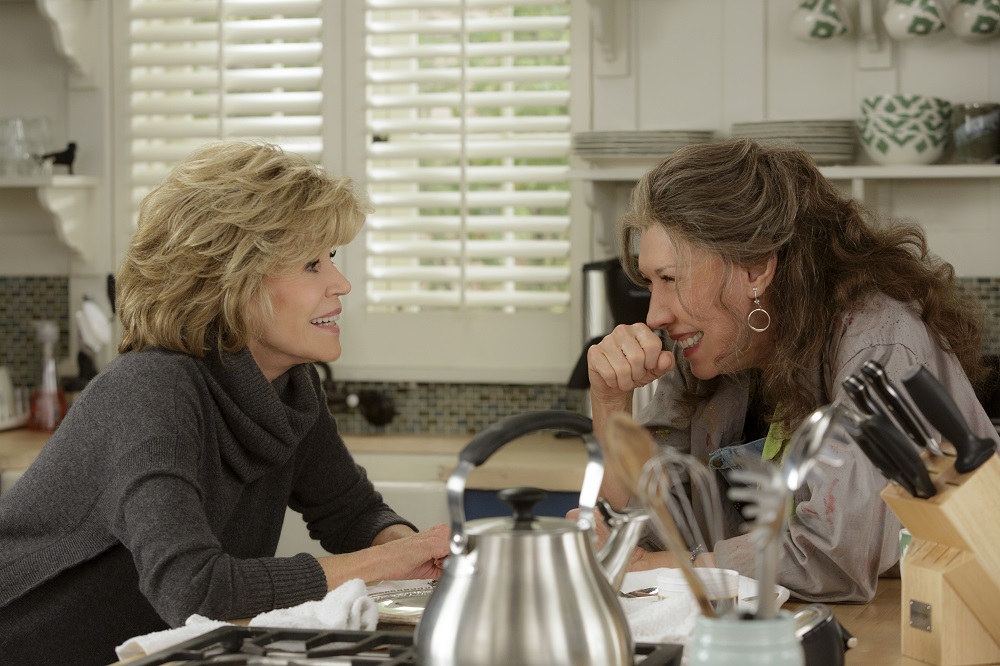Netflix continues their remarkable year—one that has already
included the premieres of “Bloodline,” “Unbreakable Kimmy Schmidt,” and “Daredevil,”
along with the return of “House of Cards”—with one of their most star-studded
productions to date in the funny “Grace and Frankie,” starring Lily Tomlin,
Jane Fonda, Martin Sheen, Sam Waterston, Ethan Embry, Brooklyn Decker, Baron
Vaughn, and June Diane Raphael. The undeniably remarkable cast shines…when
given the chance to do so. There are moments of truth about aging,
relationships, and the unpredictability of life in nearly every scene, even if the
situational comedy often threatens to overtake the character-driven honesty—a flaw
that feels more amplified by Netflix’s binge format. It’s to the credit of this
cast, which includes four Emmy winners who are likely to notch a few more Emmy nominations shortly, that it never
does.

“Grace and Frankie” opens with a sitcomish set-up. The title
characters, uptight Grace (Fonda) and hippie Frankie (Tomlin), have been
asked to dinner by their husbands Robert (Sheen) and Sol (Waterston), who
happen to be law partners. The two women have clearly known each other for
decades, but it’s the forced friendship that often comes when spouses work
together more than actual affection. They presume that their husbands have
brought them there for a celebratory dinner to announce their retirement. It
turns out that Robert and Sol are leaving Grace and Frankie, for each other.
They’ve been more than law partners for the last twenty years, sending Grace
and Frankie spinning into the similarly forced friendship that comes from
shared life trauma.
Frankie and Grace’s children are similarly sent back to
reexamine their lives, including recovering addict Coyote (Embry), Frankie’s
son, and high-strung mother Mallory (Decker), Grace’s daughter. Frankie has
another son in the supportive Nwabudike (Vaughn), while Grace’s other daughter
Brianna (Raphael) is more the cynical type who smiles as the house
burns to the ground. Comparisons are likely to be drawn to “Transparent” in the
way revelations by a patriarch (two in this case), force life reassessments by
friends and family. In this case, Frankie and Grace end up living together,
dealing with their new realities.
It’s difficult to overstate how good Tomlin and Fonda are
here. They take the rigid archetypes of the high-maintenance socialite and
low-expectation hippie and inject them with honesty. There are so many lines
and scenes that wouldn’t work if they weren’t handled by actors of such a high
caliber. When Fonda says, “We were
normal. I thought we were like everyone else. I thought this was life,” and
Sheen pauses before saying, “And I
thought there was more,” there’s a beautiful simplicity to the sentiment.
Fonda captures a woman who was going through the motions for decades, while
Sheen finds the heart of a man who needed something to break that pattern.
There are so many quick, smart decisions made by Tomlin and Fonda (and Sheen
and Waterston in smaller parts) that it’s easy to take them for granted.
The small problems with “Grace and Frankie” are more
structural. I kind of hated that episode one had to fall into a sitcomish trap
like doing peyote on a vision quest for easy humor. The
character-based stuff is so strong that the situational stuff feels even more
forced. Luckily, the cast and writing gets better as the show goes along,
discarding some of the easy set-ups of the first couple episodes. There’s a
great dinner scene in episode three without Fonda or Tomlin that allows the
rest of the supporting cast, especially Decker, to shine. And Raphael gets her moment in episode five.
Finally, I do wonder if binging “Grace and Frankie” isn’t
the way to go. It becomes so much easier to see repetitiveness in the humor
when you watch a comedy in one weekend, and so things that wouldn’t annoy you
week to week in a show like “Parks and Recreation” are amplified. Maybe not.
Maybe this is just the new way to watch TV. Netflix is certainly doing
everything they can to make that so.












